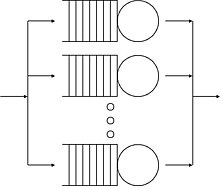
Back نظرية الأرتال Arabic Kütləvi xidmət sistemləri Azerbaijani Teoria de cues Catalan Teorie hromadné obsluhy Czech Køteori Danish Warteschlangentheorie German Θεωρία ουρών αναμονής Greek Teoría de colas Spanish Ilara-teoria Basque نظریه صف Persian

Queueing theory is the mathematical study of waiting lines, or queues.[1] A queueing model is constructed so that queue lengths and waiting time can be predicted.[1] Queueing theory is generally considered a branch of operations research because the results are often used when making business decisions about the resources needed to provide a service.
Queueing theory has its origins in research by Agner Krarup Erlang, who created models to describe the system of incoming calls at the Copenhagen Telephone Exchange Company.[1] These ideas were seminal to the field of teletraffic engineering and have since seen applications in telecommunication, traffic engineering, computing,[2] project management, and particularly industrial engineering, where they are applied in the design of factories, shops, offices, and hospitals.[3][4]
- ^ a b c Sundarapandian, V. (2009). "7. Queueing Theory". Probability, Statistics and Queueing Theory. PHI Learning. ISBN 978-81-203-3844-9.
- ^ Lawrence W. Dowdy, Virgilio A.F. Almeida, Daniel A. Menasce. "Performance by Design: Computer Capacity Planning by Example". Archived from the original on 2016-05-06. Retrieved 2009-07-08.
- ^ Schlechter, Kira (March 2, 2009). "Hershey Medical Center to open redesigned emergency room". The Patriot-News. Archived from the original on June 29, 2016. Retrieved March 12, 2009.
- ^ Mayhew, Les; Smith, David (December 2006). Using queuing theory to analyse completion times in accident and emergency departments in the light of the Government 4-hour target. Cass Business School. ISBN 978-1-905752-06-5. Archived from the original on September 7, 2021. Retrieved 2008-05-20.
© MMXXIII Rich X Search. We shall prevail. All rights reserved. Rich X Search